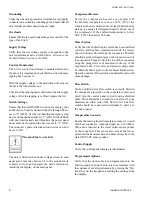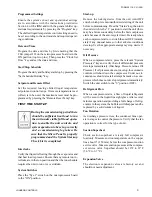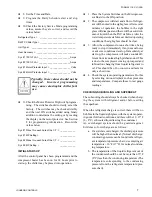
FORM 201.19-CL1 (309)
8
JOHNSON CONTROLS
The subcooling temperature of each system should be
calculated by recording the temperature of the liquid
line at the outlet of the condenser and subtracting it
from the recorded liquid line pressure at the liquid stop
valve, converted to temperature from the temperature/
pressure chart.
Example:
Liquid line pressure =
202 PSIG converted to
102°F (39°C)
minus liquid line temp. - 87°F (31°C)
SUBCOOLING =
15°F (8.3°C)
The subcooling should be adjusted to 12-15°F (6.7 -
8.3°C).
1. Record the liquid line pressure and its corre-
sponding temperature, liquid line temperature
and subcooling below:
SYS 1
SYS 2
Liq Line Press =
PSIG (kPa)
Temp =
°F
(°C)
Liq Line Temp =
°F
(°C)
Subcooling =
°F
(°C)
If equipped with an economizer, the
economizer will provide approxi-
mately an additional 20ºF (11.1ºC)
subcooling at the expansion valve in
ambients above 90ºF (32ºC). Below
90ºF (32ºC), the economizer will not
provide additional subcooling.
After the subcooling is set, the suction superheat
should be checked. The superheat should be checked
only after steady state operation of the chiller has been
established, the leaving water temperature has been
pulled down to the required leaving water temperature,
and the unit is running in a fully loaded condition.
Correct superheat setting for a system is 10 - 12°F
(6 - 7°C).
The superheat is calculated as the difference between the
actual temperature of the returned refrigerant gas in the
suction line entering the compressor and the tempera-
ture corresponding to the suction pressure as shown in
a standard pressure/temperature chart.
Example:
Suction Temp =
46°F (8°C)
minus Suction Press
60 PSIG converted
to Temp - 34°F (1°C)
12°F (7°C)
The suction temperature should be taken 6" (13 mm)
before the compressor suction service valve, and the
suction pressure is taken at the compressor suction
service valve.
The EEV is non-adjustable. Superheat
setpoint is programmable from the
keypad.
2. Record the suction temperature, suction pressure,
suction pressure converted to temperature, and
superheat of each system below:
SYS 1
SYS 2
Suction Press =
PSIG (kPa)
Suction Temp =
°F
(°C)
Suction Press
Converted
to Temp =
°F
(°C)
Superheat =
°F
(°C)



























